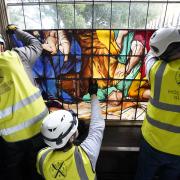Jonas Hanway was born in Portsmouth and baptised at St Thomas’ Church, today’s cathedral, in August 1712. He was the son of Thomas and Mary Hanway.
Mary already had two children from a previous marriage and there were four more from this second one, including Jonas. The family lived well enough to begin with in St George’s Square. Jonas’ life didn’t start auspiciously when he lost his father, a navy victualler, in 1714, after he fell from a horse whilst Jonas was still just a toddler. The family had to downsize and moved into rural Hampshire where Jonas attended a small local school. In 1728, aged 16, he moved to London to live with an uncle, his wanderlust years about to commence.

He was apprenticed in 1729, aged 17, to a Lisbon merchant, based in the so-called ‘English Factory’, an important centre of commerce, and would trade afterwards in St Petersburg, travelling extensively through Russia and Persia, today’s Iran, between 1743-50. These mercantile missions were not without peril as Hanway found in December 1743 when his goods were seized in Astrabad, which lay just under 20 miles from the Caspian Sea. It took until January 1745 for Hanway to make his way back to St Petersburg, a journey enlivened by sickness, periods of quarantine, being held captive more than once, and the occasional pirate. His final journey from St Petersburg commenced in July 1750 and proceeded through Germany and the Netherlands, regaining England in the October.
Hanway published a description of his travels in 1753, the ‘Historical Account of British Trade over the Caspian Sea, with a Journal of Travels, etc’, his first book (in four volumes), which gave him a certain eminence. He then spent most of the remainder of his life in London. Hanway’s mother died in 1755 and was buried alongside his father in Portsmouth Cathedral. He set up the Marine Society (1756) to maintain the supply of British seamen, then worked as a navy victualling commissioner (1762-83) which saw him in Portsmouth regularly, his office over the Square Tower in the High Street.

His new role enabled him to sort a house for himself in Red Lion Square. He was actually the author of a grand total of 74 works, mostly pamphlets, writing for example against the practice of giving gratuities or tips.
He also criticised tea drinking, which brought him into conflict with the famous lexicographer Dr. Johnson and the Anglo-Irish novelist Oliver Goldsmith. In fact, his opposition to the supping of tea was pretty much legendary as he put pen to paper with ‘An Essay on Tea’ which presumably Johnson, Goldsmith and others read over a cuppa. Johnson responded with his own essay in 1757 leading to a heated debate bordering on a duel between the pair; Darjeeling at dawn you might say. You’d have thought Hanway might have reserved his ire for something slightly more annoying, but Hanway was unrelenting for tea was ‘pernicious to health, obstructing industry and impoverishing the nation’. Actually, perhaps he had a point. Whenever we have workmen in there seem to be more tea breaks than evidence of hard graft. He continued. Tea drinking caused bad breath, a weakening of the nerves and resulted in ‘ugliness’. Because of our increasing imports of tea Hanway thought we were spending too much on this decadent pleasure, money that was slipping out of the country in foreign imports, money that could have been used to strengthen the navy. Of Portsmouth’s two famous merchants, Jonas Hanway was the tea hater, Josiah Child the tea lover.

What marked Hanway out though was his unrelenting befriending of some of life’s unfortunates, including child chimney sweeps, waifs and strays, and down-and-outs. All in all, he was a good and philanthropic citizen, a tendency that he may have first picked up in Lisbon, a city with a long history of philanthropy. He became a governor of the Foundling Hospital which had been established in London in 1739 for the ‘education and maintenance of exposed and deserted young children’ and he was also a key figure in the creation of the Magdalen Hospital in Whitechapel in 1758 for the housing of ‘fallen women’.
He recommended solitary confinement for prisoners and milder punishments, this at a time when the criminal code was draconian to say the least. By 1815, nearly 30 years after Hanway had died, there were still 215 crimes punishable by the death penalty in this country including stealing from a rabbit warren and cutting down trees. See what I mean? Hanway might have been a candidate for the ‘nanny state’ though as he recommended washing once a week, changing one’s clothes every eight to ten days, and not staying up late.

When he wasn’t writing or being benevolent Hanway would have been notable for his use of the ‘brolly’; apparently, he was the first Englishman to carry an umbrella (some sources give him less credit, merely conceding that he was the first man in London to have one). Apparently, ladies had been sporting umbrellas since 1705 but there was something just ‘not cricket’ about a man waving one around and Hanway soon found that it was not just Persia that could be perilous as London’s hackney drivers tried to run him over (presumably vexed at a potential loss to their business as the well-to-do just walked with a brolly rather than jumping into a carriage at the first suggestion of precipitation).
Hanway never married. He died alone on September 5, 1786, aged 74. He was considered worthy enough for a memorial in Westminster Abbey’s North Transept. The memorial dubs him ‘The Friend and Father of the Poor’ and lists some of his virtues and achievements thus: ‘The helpless infant nurtur’d thro’ his care, the friendless prostitute shelter’d and reform’d, the hopeless youth rescu’d from misery and ruin, and train’d to serve and to defend his country’. It’s a pity he didn’t also campaign against the inappropriate and unnecessary use of the apostrophe.




























